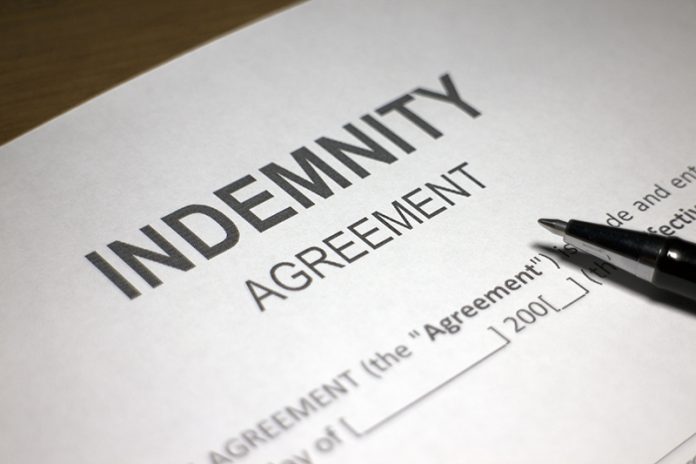This article has been written by Shreya Shambhavi, pursuing the Certificate Course in Banking & Finance Practice: Contracts, Disputes & Recovery from LawSikho.
Table of Contents
Introduction
Indemnity in simple English means providing security or protection against loss or other financial burden. When put into contracts, the Indian Contract Act, 1872, under section 124, provides the definition of “contract of indemnity” as a “contract by which one party promises to save the other from the loss caused to him by the conduct of the promisor, himself, or by the conduct of any other person”. One of the essential factors to be noted while drafting Indemnity clauses, amongst others, is that the drafting should be with clarity and the intent should clearly come out laying down the instances on the occurrence of which a claim of indemnity shall arise.
Pertinent to highlight, the indemnity clause shall be read in conjunction with any exclusions to liability stated anywhere else in the agreement. The jurisprudence on the concept of indemnity has evolved and in one of the cases, Bombay High Court has held in the case of Gajanan Moreshwar Parelkar vs Moreshwar Madan Mantri .that “ICA is both an amending and a consolidating Act, and it is not exhaustive of the law of contract. Section 124 deals only with one particular kind of indemnity in which the loss is caused by the conduct of the indemnifier himself or of other person, but does not cover the cases outside this or cases when liability arises because of something done by the indemnified at the request of the indemnifier. The Hon’ble court also went on to say that as the laws on indemnity are not exhaustive, equitable principles shall be applied to it for interpretation.
Sale deed vs Agreement to sell
There is different in the concept of an An agreement to sell an immovable property is a vis a sale deed. It will not be out of place to mention that the scope of an indemnity clause in both the forms of contract may be different or an indemnity may not at all be required in an agreement to sell. Let us first understand the difference in the two concepts-
|
Sale Deed |
Agreement to Sell |
|
Actual transfer of right, title and interest in immovable property. |
Only a promise to transfer the immovable property in future. |
|
Sale deed lays down the rights and interests in the property that has passed on to the new owner. |
Lays down the conditions to be fulfilled by the purchaser before the sale of the property. |
|
Stamp duty and registration implications on the buyer. |
Agreement to sell precedes sale deed, However, some states under their respective stamp act, mandates the requirement for registration of the agreement to sell. |
Importance of an indemnity clause under sale deed or agreement to sell
An Agreement to Sell, in some states is executed before the Sale deed and it requires compulsory registration, while in other states, no registration is mandatory. By virtue of execution an agreement to sell, the purchaser pays some token amount to the seller.
The Agreement to Sell should clearly lay down all the terms and conditions for sale and all the defects associated with the immovable property proposed to be sold. The title of the property shall be clear and it is the responsibility if the seller to disclose all the material facts in relation to the property while the buyer shall carry out all the necessary due diligence required to be sure that the title of the property is clear and marketable. It must be ensured by the buyer that the immovable property should not be subject of any pending litigation.
Sale Deed otherwise evidences the transfer of ownership of immovable property, governed by the Transfer of Property Act and the Registration Act, 1908. A sale deed is the principle document which enlists amongst others, that the property is free from any encumbrances or liabilities. A sale deed is a proof of ownership of the immovable property.
Transaction pertaining to sale of immovable property are critical for the purchasers as the hard erned money is involved. Keeping that in mind, one should be very careful in reading and understanding the contract of sale. Having an indemnity clause in an agreement to sell protects the buyer against any legal dispute which may arise or if the title of the property is found defective or any other scenario which prejudices the rights of the buyer and may be triggered by either: a) breach of contract; b) party’s fault or negligence; or c) a specific action. Indemnity clauses are used to manage the risks.
Under the Agreement to sell, typically, the tight, title and interest under the immovable property is not transferred to the buyer but the contract of sale is contingent upon fulfilling certain terms and conditions as is elaborated under the Agreement to sell. The Purchaser has the option to rescind the contract and depending upon the terms of the contract, money that is advanced by the buyer to the seller is refunded back with the component of interest, if applicable. Therefore, the scope of indemnity may or may not be required to be built under the Agreement of Sale. This may be as per the discretion of the parties.
However, under a Sale Deed, the position of the purchaser is such that if there are any defects in the title of the property or any encumbrances thereon, this shall largely affect the rights of the purchaser and hence, it is imperative that indemnity shall be built into the sale deed.
Who should give indemnity?
It is observed that in commercial transaction, whoever has a strong negotiating position, demands indemnity from the other contracting party. Indemnity may be useful when:
- Either of the party is likely to suffer a loss from the transaction in question; or
- Damages stipulated under the contract are not sufficient remedy.
Sample clause of indemnity under the Sale Deed and an Agreement to Sell [taken from standard templates available online]
“That the Seller hereby assures the purchaser and declares that he is the sole, absolute, exclusive and rightful owner of the above mentioned property under sale, and is fully competent and has full power, absolute authority and unrestricted rights to sell and transfer the same, and the same is free from all sorts of encumbrances, burden, sale, mortgage, gift, lien, decree, charges, court injunction orders, stay orders, liability, transfer, attachment, litigation, legal flaws, dispute, notices, surety, security, notifications, acquisition etc. and there is no legal defect in the title of the Seller. If it is proved otherwise, the Seller shall be liable to indemnify the purchaser in full or part to the extent of loss sustained by the vendee at the prevalent market value of the said property at that time with all cost, expenses and damages, etc. and the purchaser shall have full rights to recover the same, alongwith the cost and expenses of additions, alterations, renovations, modifications, etc. through the court of law.”
“That the FIRST PARTY assures the SECOND PARTY that the said portion of the said property is free from all kinds of encumbrances such as prior Sale, Gift, Mortgage, Will, Trust, Exchange, Lease, legal flaw, claims, prior Agreement to Sell, Loan, Surety, Security, lien, court injunction, litigation, stay order, notices, charges, family or religious dispute, acquisition, attachment in the decree of any court, hypothecation, Income Tax or Wealth Tax attachment or any other registered or unregistered encumbrances whatsoever, and if it is ever proved otherwise, or if the whole or any part of the said portion of the said property is ever taken away or goes out from the possession of the SECOND PARTY on account of any legal defect in the ownership and title of the FIRST PARTY then the FIRST PARTY will be liable and responsible to make good the loss suffered by the SECOND PARTY and keep the SECOND PARTY saved, harmless and indemnified against all such losses and damages suffered by the SECOND PARTY.”
“That in pursuance of the said agreement and in consideration of the Purchaser not insisting for the title deeds and other documents in respect of the said house, the Seller hereby covenants with the Purchaser that the Seller will at all times hereafter indemnify and keep indemnified the Purchaser against all claims, demands, actions, proceedings, losses, damages, costs, charges and expenses which may be brought or commenced against the Purchaser or which the Purchaser may or may have to incur or may have to suffer as a result, direct or indirect, for non-production by the Seller of the title deeds in respect of the house.”
Ground for claiming indemnity by the Purchaser
- Defect in the title of the property purchased;
- Breach of sale deed;
- Misrepresentation/fraud committed by the seller (this clause may be applicable for the seller too);
- Loss/claims on the purchaser for the unpaid taxes, before the period of sale;
- Any other foreseeable damage caused to the purchaser which displaces his possession or right to the immovable property;
- Litigation costs incurred by the purchaser on account of any of the above;
While the purchaser of the property should do a thorough due diligence of the title of the property before parting with the money, it is also the obligation of the seller to convey clear and marketable title to the purchaser and disclose all the correct facts associated with the immovable property.
Ingredients of an indemnity clause that should not be built in the sale deed
- Exclusion of indemnity;
- Limitation of liability under indemnity:
However, while drafting an indemnity clause, the following should be specifically included:
a) Losses a party may anticipate to suffer;
b) events under which losses will arise (i.e. which event/action should trigger the indemnity);
c) who should pay for the losses; and
d) the extent to which the indemnifying party should pay for the losses.
Conclusion
Buying an immovable property is a thought after decision taken by an individual where they invest almost the entire savings and also taken loan on them which continues for half of their lives. Hence, it becomes essential that the transaction of sale should be clean and the rights that are transferred to the purchaser absolute. An indemnity clause secures the interests of the buyer; it must be drafted with diligent foresight to avoid any dispute in the future. Indemnity clauses under the Sale Deed are designed to seek compensation from the seller should there be any losses or expenses in the future. It should be noted that all possible scenarios must be taken into account before drafting the indemnity clause.
References
Online Articles available on the topic and case laws on Advocate Khoj.com
Students of Lawsikho courses regularly produce writing assignments and work on practical exercises as a part of their coursework and develop themselves in real-life practical skill.
LawSikho has created a telegram group for exchanging legal knowledge, referrals and various opportunities. You can click on this link and join:
 Serato DJ Crack 2025Serato DJ PRO Crack
Serato DJ Crack 2025Serato DJ PRO Crack











 Allow notifications
Allow notifications


